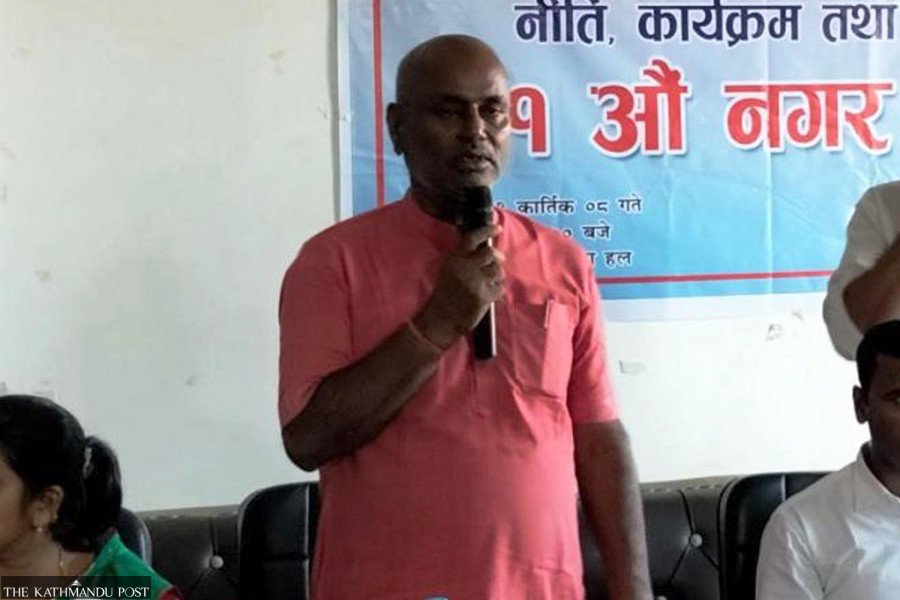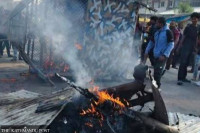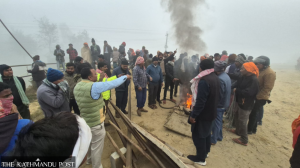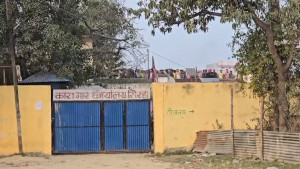Madhesh Province
Budget deadlock in Parsa’s Bahudarmai Municipality as mayor stalls authorisation
The delay has left employees and social security beneficiaries without pay for three months and stalled projects.
Bhusan Yadav
All financial activities halted in Bahudarmai Municipality of Parsa due to budget holiday. Municipal employees and teachers are missing their monthly salaries, beneficiaries are deprived of social security allowances, and development activities have come to a grinding halt since the start of the current fiscal year on July 16.
Bahudarmai Municipality could endorse its annual budget for the current fiscal year 2024-25 only after a four-month delay. However, the budget holiday continued even after the municipal assembly passed the budget on October 24 as the mayor has not yet authorised the chief executive officer to allocate funds.
Chief administrative officer Mahammad Shere Mustafa and other municipal employees claim that the protracted budget holiday is due to Mayor Singhasan Sah Teli’s refusal to authorise the chief administrative officer to implement the budget.
“The municipal assembly passed the budget, albeit late, on October 24. I telephoned the mayor on October 27 for his signature to authorise the budget. He told me that he had to visit Birgunj on some business and would sign it upon his return. I followed up two days later but to no avail,” said Mustafa.
According to employees of the municipality, all decisions made by the municipal employees were entered into the computer database by October 27, yet the budget has not been implemented due to the mayor’s continued refusal to give authorisation for fund allocation.
Mayor Teli, however, has his own explanation for the delay. He said that he has not signed the budget for implementation because he has not thoroughly reviewed it. “I was on leave so I could not study the budget in detail. How can I sign it without studying it?” said Teli. He further claimed that he has not yet received the budget book [detailing allocations under different headers].
According to Mustafa, the draft committee had taken the final decision only after the mayor and deputy mayor had approved the drafts plans and budget three days before the municipal assembly. “The same decisions were entered into computer software, and the mayor only needs to sign the printed version for implementation. We are prepared to face legal consequences if any mistakes are found. Otherwise the mayor should allow the implementation of the budget,” said Mustafa.
The ward chairs and members expressed their concerns over the delay in budget implementation. On Tuesday, they met with the mayor, deputy mayor, and municipal employees to press them for budget implementation.
“We held the municipal assembly before Tihar expecting that employees and teachers would receive their salaries and beneficiaries their social security allowances ahead of Tihar and Chhath (a major festival in the Tarai that falls on November 7 this year),” said Dinesh Prasad Yadav, chairman of Ward No 3 of Bahudarmai Municipality. “It is unfortunate that salaries and allowances could not be distributed even during these major festivals,” He claimed that the mayor was reluctant even to hold the municipal assembly fearing that he would fall into a minority that could impact important decisions.
A highly-placed source claimed that Mayor Teli is intent on transferring Mustafa, the chief executive officer, elsewhere before authorising the budget. “He visited Kathmandu several times to transfer the chief administrative officer. He has delayed the budget implementation after he failed to transfer Mustafa,” said the source.
This pattern is common, especially in Madhesh where local units fail to present the annual budget on time. According to the Local Government Operation Act and the Intergovernmental Fiscal Arrangement Act-2017, local units are required to present their fiscal budgets for the upcoming fiscal year by Asar 10 (June 24) to their village or municipal assemblies.
Governments—federal, provincial and local—cannot spend without passing their budgets. The budget is essentially a law requiring endorsement by Parliament at the federal level, by provincial assembly at the provincial level, and village or municipal assemblies at the local level.
Disputes among people’s representatives often hinder village and municipal assemblies, which ultimately affect daily administrative work and development activities. Some of the issues that cause disputes among mayors and deputy mayors include project selection, budget allocation, and use of office vehicles and other benefits. While the reason behind the disputes in most of the local units is that mayors and deputy mayors are from different parties, in some local units even those from the same political parties are also not on good terms.




 17.12°C Kathmandu
17.12°C Kathmandu













